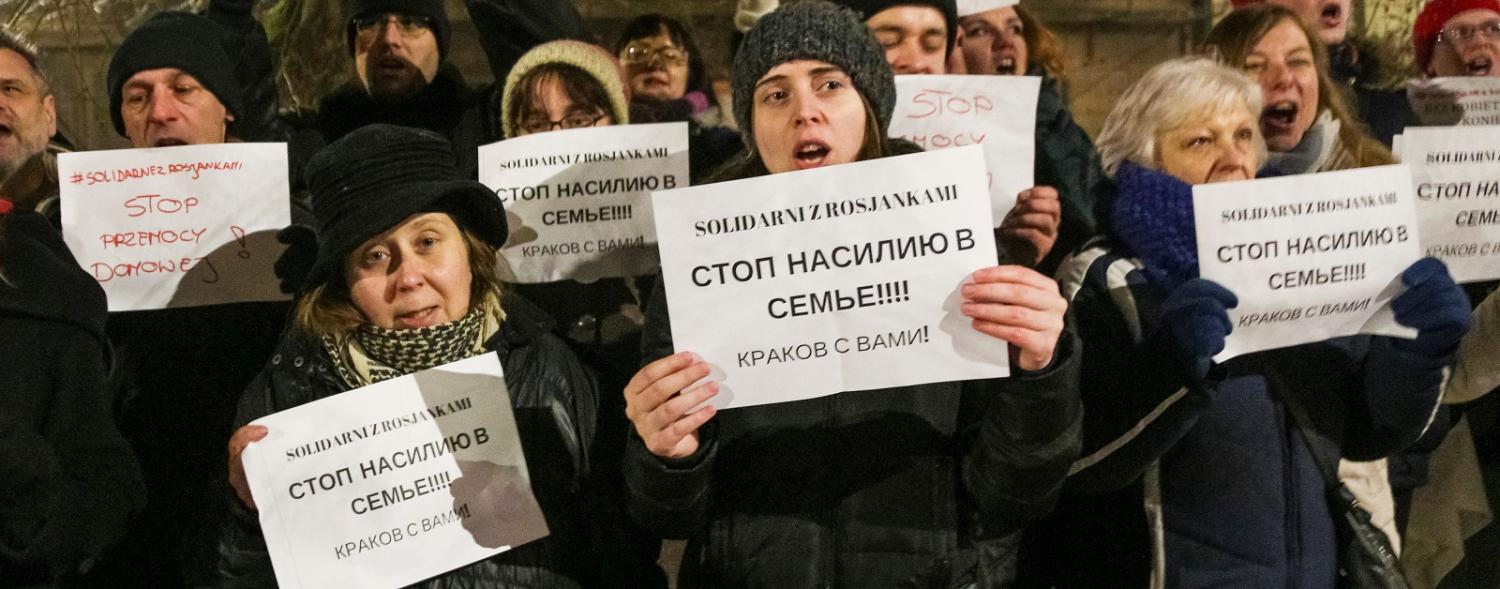Russia is moving to decriminalise domestic violence. Dubbed the 'slapping law', the bill that decriminalises certain acts of domestic violence was introduced by conservative parliamentarian Yelena Mizulina in January. It has now passed its third reading in the lower house, 380 MPs voted in support of the bill, only three were against.
The legislation would contradict the spirit of the Convention on the Elimination of Discrimination Against Women (CEDAW), to which Russia has acceded, breach Article 19 of the Convention on the Rights of the Child (ditto), and also undermine the UN Secretary-General’s Campaign to End Violence Against Women. It also follows a trend in Russia’s international negotiations to downplay or even reverse the rights of women in international fora such as the United Nations Commission on the Status of Women.
The bill still needs to be passed by the upper house and approved by President Vladimir Putin before becoming law. Despite ongoing campaigning, human rights activists are not optimistic and think 'it is likely that it is going to become law'. The bill covers parental conduct towards children and the conduct between spouses, and even conflict among more extended kin, such as grandparents. It defines an initial assault that does not require hospitalisation or sick leave from work as an administrative rather than criminal offence. A subsequent assault within 12 months would remain criminal. However, in abusive relationships, it is possible the law will prevent victims from seeking or receiving the assistance they require.
Russian journalist Olga Bobrova says 'domestic violence is a normal way of life' in Russia. Indeed, official statistics show that more than 40% of all violent crimes in Russia occur within the family. But independent research suggests the problem is even worse. One study found that at least 70% of women had experienced at least one type of violence from their husbands. Some 80% of violent crimes against women in Russia are committed by a spouse or intimate partner.
Yelena Mizulina is the chair of the parliamentary committee on family and women’s affairs. In addition to her role in promoting this new legislation, she has repeatedly attempted to undermine the rights of the LGBTQI community in Russia. In the past, she also introduced a bill to prevent women from entering higher education unless they had already given birth to a child, no doubt in reaction to Russia’s abysmal fertility rate. Of this bill, she has said 'in Russian traditional family culture parent-child relationships are built on the authority of the parents' power... The laws should support that family tradition'.
The passage of this bill follows a trend in which Russia has consistently undermined the rights of women not only in its own country, but also on the international stage. At the UN Commission on the Status of Women, Russia has repeatedly pressed for the removal of human rights framing from all resolutions dealing with women, and has relentlessly attempted to stymie the work of women’s civil society organisations. This was particularly evident during negotiations for the Political Declaration for the 20th anniversary of the Beijing Declaration and Platform for Action, the most comprehensive document on the advancement of women’s rights and gender equality. Russia played a key role, with other actors such as The Holy See, China and Iran, to weaken critical areas of concern, including women’s human rights, violence against women and women in power and decision making.
Russia has also turned a blind eye to unsavoury developments such as the return of polygyny in areas such as Chechnya, as well as the imposition of the veil on women in Chechnya and Dagestan. Last week, Vladimir Putin proclaimed Moscow prostitutes were the best in the world, even though prostitution is illegal in Russia, signalling his own disrespect of the rule of law where women are concerned.
So why should anyone besides Russians care about these developments? Research has shown that the reversal of women’s rights is a bright line indicator that a nation is becoming indifferent to human security and more accepting of the use of force and coercion at home and abroad. The Russian case makes this plain. As Robin Morgan famously wrote in The Demon Lover: The Roots of Terrorism: 'whatever cruelties men visit upon one another they have first tested and refined on women'.
Nations with high levels of violence against women are the most unstable, insecure, and violent of all nations. Men who approve or even simply acquiesce to the subordination and coercion of the women in their midst are approving and acquiescing to something more: simply put, the tactics used on women will most certainly shape their nation’s methods of governance and of foreign policy. And other nations should care what happens to Russia’s women, for not only will they face a less stable and more violent Russia, but they also should expect the very same treatment from Russia one day.

